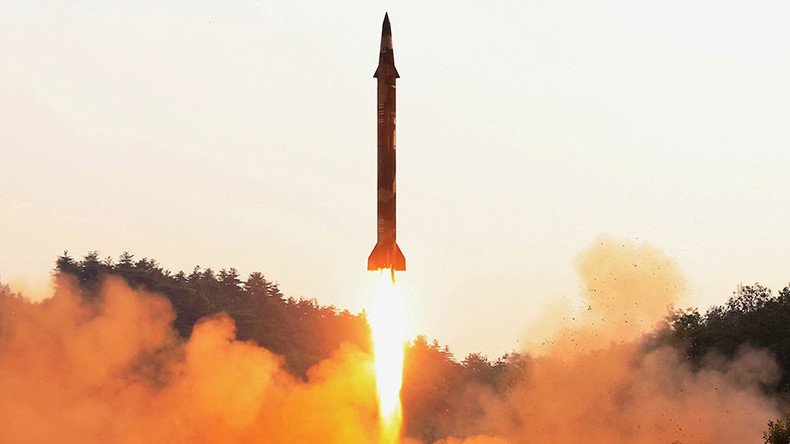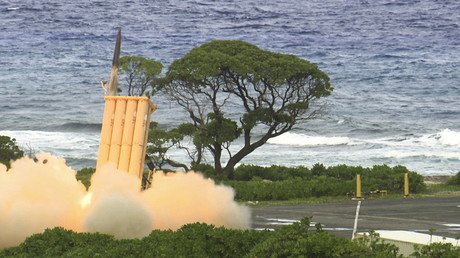‘North Korea in period of great vulnerability, US may be tempted to attack’

North Korea is now at a time of high vulnerability; it’s between when it is evident it can develop a proper deterrent against the US and attaining it, said Tim Beal, researcher, and Asia specialist. Other experts join the discussion.
North Korea test-fired several suspected ground-to-ship missiles on Wednesday, according to the South Korean military. The missiles flew around 200 kilometers, or 124 miles, before landing in the Sea of Japan.
Japan says it hasn't suffered any damage in this latest launch, but criticized it and said that it would continue to coordinate with the US to deter North Korea.
RT asked political analyst Joseph Cheng what might be expected from Japan and the US.
BREAKING: #NorthKorea fires ‘multiple ballistic missiles’ – Seoul https://t.co/CzvIp9XFMfpic.twitter.com/Xw8QCCgVhm
— RT (@RT_com) June 7, 2017
“There is not much they can do. They can certainly try to pass a resolution at the UNSC continuing to condemn Pyongyang. They can further tighten economic sanctions against Pyongyang. But at the moment it is an impasse; unless some parties are willing to talk to Pyongyang, you cannot expect many breakthroughs in the months ahead. Certainly, Pyongyang has been careful to avoid a further nuclear test at this stage because this is seen to be too provocative,” he said.
The US has been demanding China do more to curb Pyongyang's missile and nuclear program. In Cheng’s opinion, Beijing will probably continue to put pressure on its neighbor, but won’t severe ties with Pyongyang.
“I think such pressures have already provoked the Pyongyang regime to criticize China openly in its official media. But on the broad scale, China doesn’t want to break relations with Pyongyang. It still wants to have a long-term, correct relationship with the Pyongyang. Therefore, while China is willing to go along with the sanctions proposed by the US and Japan, it will not totally cut off food supply and oil supply to North Korea,” the analyst said.
N. Korea ‘feels threatened’
Brian Becker, from the anti-war ANSWER coalition, suggests this latest test will be followed by “a lot of bluster... a lot of noise; there will be additional demands that the UN impose additional economic sanctions on North Korea."
Becker recalled that just about a week ago the US reportedly “engaged in a nuclear bomb-dropping drill right off the coast of North Korea – in other words simulating the nuclear destruction of North Korea.”
“Was the mainstream media, or Japan, or the US government, or any of the UN bodies making a big deal about that? It is completely rational that the DPRK [Democratic People's Republic of Korea] under these circumstances would continue to try to improve its missile technology because it feels threatened,” he said.
The head of the US missile defense agency, Vice Admiral James Syring said Wednesday that Pyongyang's ballistic missile tests are a cause for concern to the US and its allies, but existing defense technology can address the current threat.
In Becker’s opinion, the US is “justifying the deployment of THAAD, the Terminal High Altitude Area Defense, in South Korea.”
“They are trying to make the case that the deployment of this missile defense shield is done in response to North Korea’s so-called provocations,” he said.
However, Becker said, “the deployment of that is a direct, and perceived to be a direct threat, to the People's Republic of China and Russia – in other words, major nuclear powers, not toward North Korea.”
But what goals does Pyongyang perceive by conducting multiple missile tests in the past several months?
Tim Beal, researcher, and Asia specialist says:
“North Korea is in a period of great vulnerability at the moment. It is a period between when it is obvious they can develop a proper deterrent against the US, in other words ultimately being able to strike the US mainland and actually attaining that… The US may be tempted to attack now because if it doesn’t then, it won’t be able to attack in the future. So it is a vulnerability gap.”
He said the North Koreans are particularly worried about two things.
First, it that “the Americans can attack them from the sea because Americans have control of the sea.”
“The other thing they are worried about I presume is amphibious landings. There was the amphibious landing at Inchon in 1950, which turned the tide of the Korean War. And this is one of the features of the joint US- South Korean military exercises twice a year – they have these amphibious landings. So one presumes that the Americans in the event of a war plan amphibious landings either in sort of marine attacks, decapitation attacks, or something more substantial. So anti-ship missiles are an important part of the arsenal to defend against that,” Beal added.
The statements, views and opinions expressed in this column are solely those of the author and do not necessarily represent those of RT.













